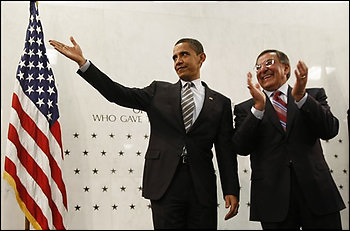We’re back at it – now as bureauphile. Check us out here.
Thanks for stopping by! As you can see, this blog was a casualty of too many competing commitments (driven most of all by the ticking of the “tenure clock”). While we haven’t posted here in awhile, we continue to plug away on the research. If you’re interested, drop us a line. My email: mdull@vt.edu.
In Roll Call (9/29): Patrick Roberts and Matthew Dull, “Is Obama using his appointment power effectively?”
True, not much activity here as of late, but we’ve been busy writing! Here are two recent papers on appointees:
Dull, Matthew and Patrick S. Roberts, 2009. “Continuity, Competence, and the Succession of Senate-Confirmed Agency Appointees, 1989-2009,” Presidential Studies Quarterly. 39:3 (September): 432-453.
Dull, Matthew M., Roberts, Patrick, Choi, Sang Ok and Keeney, Michael. 2009. “Appointee Confirmation and Tenure: Politics, Policy, and Professionalism in Federal Agency Leadership, 1989-2009”. APSA 2009 Toronto Meeting Paper. Available at SSRN: http://ssrn.com/abstract=1450719
Government 2.0? That’s the tagline given the Obama administration’s embrace of internet technologies to promote government transparency. The administration’s website tracking Recovery and Reinvesment Act – Recovery.gov – has generated attention and the management consulting firms are catching the spirit (check out the recent posts on the AGA weblog, for example). Is there substance behind the rhetoric? It’s too soon to tell, but as a reform initiative, Government 2.0 is compelling for a couple reasons. Without overstating matters, it seems safe to say internet-enabled communication is transforming our lives in a variety of far-reaching ways, though the long term consequences of course are unknowable. By all accounts, the Obama 2008 campaign succeeded by organizing around a powerful political message enabled new communication technologies. Government 2.0 arguably builds on that momentum.
Moreover, like almost all reform initiatives that actually take hold, the elements of Government 2.0 preceded its brand name. Examples abound, but my favorite is the story of Bush OMB official Robert Shea‘s decision to purchase the platform for USASpending.gov (mandated under the Obama and Coburn sponsored Federal Funding Accountability and Transparency Act of 2006 ) from the gadflies at OMB Watch. A truly improbably alliance. But more importantly initiatives like this one have established the groundwork for what the Obama administration is attempting to accomplish with Recovery.gov and it’s broader efforts around Internet-enabled transparency. Again, as a student of these things, I can offer no wisdom about what will come of it, but it certainly is interesting to watch!
“Editing an information release.” United States Department of Agriculture (USDA). Washington, D.C. 1937. Part of a series by Farm Security Administration photographer Arthur Rothstein. Office of War Information Photograph Collection. Library of Congress.
Among the “eggheads” (to borrow a slightly dated term) dominating the upper tiers of the Obama administration – Summers and Orszag being perhaps the most prominent examples – Chicago law professor Cass Sunstein, named by Obama to head the Office of Information and Regulatory Affairs (OIRA), may be my favorite. Sunstein is brilliant, an unbelievably productive scholar – and, indeed, that presents something of hazard. Sunstein’s 2008 book with economist Richard Thaler Nudge: Improving Decisions About Health, Wealth and Happiness was widely read – and has generated much discussion about what it means for OIRA.
“I will be as vigorous in protecting you, as you are vigorous in protecting the American people.”
Setting aside the usual rock star welcome, President Obama’s remarks during his first visit to the CIA headquarters in Langley, VA offers still another extraordinary moment in the interplay between the presidency and public sector professionalism. Here’s an article in the Post and a transcript of the President’s remarks – and here’s the video from cspan.org.
The Frances Perkins Center is hosting several upcoming events celebrating our first female cabinet member and still the longest-serving Secretary of Labor. The first is this Tuesday (4/21) at 4:00 PM at the Department of Labor’s Frances Perkins Building, 200 Constitution Ave. The recent Perkins biography by Kirstin Downey is discussed here.
From Congress Daily:
Attorney general orders refresher courses for federal prosecutors
CongressDaily April 15, 2009
In the wake of the botched prosecution of former Sen. Ted Stevens, R-Alaska, Attorney General Eric Holder is ordering all federal prosecutors to take a refresher course in their requirements to turn over all evidence to the defense in criminal cases. Failure of prosecutors to give the Stevens defense team key documents led Holder to drop the case April 1…
In the coming week, Holder said “federal prosecutors throughout the department” will get supplemental training in their obligations to give the defense all evidence in criminal cases. Holder set up a working group of senior prosecutors and department officials to review practices in criminal cases. The group will be headed by the assistant attorney general of the criminal division and the chairman of the attorney general’s advisory committee.
Attorney General Holder is emerging as among the most intriguing figures in the Obama cabinet. The legacies of the Bush administration have created an environment favoring Holder’s efforts to revise and reinforce legal professionalism in DOJ. He is a “true believer” and seems intent on (re)infusing a particular set of professional values through the ranks. Unfortunately, from a scholarly perspective, this type of leadership strategy is not particularly well-structured. It seems to me there is room to think more systematically about the interplay between presidents and the variety of professionalisms – PA, law, accounting, the sciences.
One knock on the Obama administration thus far is that it has not articulated a “management” philosophy – it’s all policy, leaving management in the lurch. History and the heavy hand of the Bush administration’s President’s Management Agenda (PMA) lead observers to expect a big set of administrative principles and priorities. The uncertainty one hears from managers across the agencies could become an important weakness in the administration’s efforts to enact a broad and ambitious set of policy commitments. And, no doubt, the failure of the administration to get many senior positions confirmed and in place has been an exacerbating factor. However, a contrasting perspective emphasizes instead an administrative strategy rooted in a professional as opposed to a managerial logic. (Here I am borrowing Eliot Freidson’s language). Rather than shape bureaucratic behavior through management and planning, a professional logic shapes behavior through norms, prestige, and professional governance. I’m certain there are many counter-examples, but certainly at DOJ, FEMA, the agencies responsible for science policy – the Obama approach to the agencies seems rooted in a kind of contingent strategy oriented around varieties of professionalism. Naive? Perhaps.






